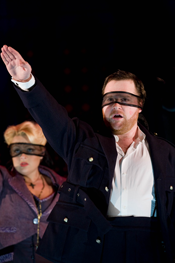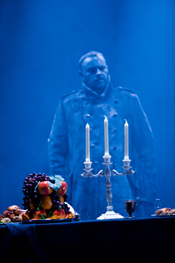
06 Apr 2008
DON GIOVANNI – English Touring Opera
The last of the three operas on ETO's Spring 2008 tour was sung in English, and updated to a Spain of the mid-twentieth century under Franco.
English Touring Opera are delighted to announce a season of lyric monodramas to tour nationally from October to December. The season features music for solo singer and piano by Argento, Britten, Tippett and Shostakovich with a bold and inventive approach to making opera during social distancing.
This tenth of ten Live from London concerts was in fact a recorded live performance from California. It was no less enjoyable for that, and it was also uplifting to learn that this wasn’t in fact the ‘last’ LfL event that we will be able to enjoy, courtesy of VOCES8 and their fellow vocal ensembles (more below …).
Ever since Wigmore Hall announced their superb series of autumn concerts, all streamed live and available free of charge, I’d been looking forward to this song recital by Ian Bostridge and Imogen Cooper.
Although Stile Antico’s programme article for their Live from London recital introduced their selection from the many treasures of the English Renaissance in the context of the theological debates and upheavals of the Tudor and Elizabethan years, their performance was more evocative of private chamber music than of public liturgy.
Evidently, face masks don’t stifle appreciative “Bravo!”s. And, reducing audience numbers doesn’t lower the volume of such acclamations. For, the audience at Wigmore Hall gave soprano Elizabeth Llewellyn and pianist Simon Lepper a greatly deserved warm reception and hearty response following this lunchtime recital of late-Romantic song.
For this week’s Live from London vocal recital we moved from the home of VOCES8, St Anne and St Agnes in the City of London, to Kings Place, where The Sixteen - who have been associate artists at the venue for some time - presented a programme of music and words bound together by the theme of ‘reflection’.
'Such is your divine Disposation that both you excellently understand, and royally entertaine the Exercise of Musicke.’
‘And there was war in heaven: Michael and his angels fought against the dragon; and the dragon fought and his angels, And prevailed not; neither was their place found any more in heaven … that old serpent … Satan, which deceiveth the whole world: he was cast out into the earth, and his angels were cast out with him.’
There was never any doubt that the fifth of the twelve Met Stars Live in Concert broadcasts was going to be a palpably intense and vivid event, as well as a musically stunning and theatrically enervating experience.
‘Love’ was the theme for this Live from London performance by Apollo5. Given the complexity and diversity of that human emotion, and Apollo5’s reputation for versatility and diverse repertoire, ranging from Renaissance choral music to jazz, from contemporary classical works to popular song, it was no surprise that their programme spanned 500 years and several musical styles.
The Academy of St Martin in the Fields have titled their autumn series of eight concerts - which are taking place at 5pm and 7.30pm on two Saturdays each month at their home venue in Trafalgar Square, and being filmed for streaming the following Thursday - ‘re:connect’.
The London Symphony Orchestra opened their Autumn 2020 season with a homage to Oliver Knussen, who died at the age of 66 in July 2018. The programme traced a national musical lineage through the twentieth century, from Britten to Knussen, on to Mark-Anthony Turnage, and entwining the LSO and Rattle too.
With the Live from London digital vocal festival entering the second half of the series, the festival’s host, VOCES8, returned to their home at St Annes and St Agnes in the City of London to present a sequence of ‘Choral Dances’ - vocal music inspired by dance, embracing diverse genres from the Renaissance madrigal to swing jazz.
Just a few unison string wriggles from the opening of Mozart’s overture to Le nozze di Figaro are enough to make any opera-lover perch on the edge of their seat, in excited anticipation of the drama in music to come, so there could be no other curtain-raiser for this Gala Concert at the Royal Opera House, the latest instalment from ‘their House’ to ‘our houses’.
"Before the ending of the day, creator of all things, we pray that, with your accustomed mercy, you may watch over us."
The doors at The Metropolitan Opera will not open to live audiences until 2021 at the earliest, and the likelihood of normal operatic life resuming in cities around the world looks but a distant dream at present. But, while we may not be invited from our homes into the opera house for some time yet, with its free daily screenings of past productions and its pay-per-view Met Stars Live in Concert series, the Met continues to bring opera into our homes.
Music-making at this year’s Grange Festival Opera may have fallen silent in June and July, but the country house and extensive grounds of The Grange provided an ideal setting for a weekend of twelve specially conceived ‘promenade’ performances encompassing music and dance.
There’s a “slide of harmony” and “all the bones leave your body at that moment and you collapse to the floor, it’s so extraordinary.”
“Music for a while, shall all your cares beguile.”
The hum of bees rising from myriad scented blooms; gentle strains of birdsong; the cheerful chatter of picnickers beside a still lake; decorous thwacks of leather on willow; song and music floating through the warm evening air.

The last of the three operas on ETO's Spring 2008 tour was sung in English, and updated to a Spain of the mid-twentieth century under Franco.
The updated scenario presented the usual problems over how to deal with the plot's all-important class hierarchy, and although having the Don as a high-ranking officer went some way towards solving the problem, the idea wasn't really followed through to create a coherent structure to accommodate all the characters.
That said, it was the strongest of the three productions, directed by Jonathan Munby, and was to all intents and purposes an uncomplicated, gimmick-free staging, true to what Mozart and Da Ponte surely envisaged. The very idea of having the Commendatore in a 'statue' costume and turning up to supper seems to be oddly out of fashion these days, and tends to be passed over in favour of a bloodied reanimated corpse or a drug-induced hallucination invisible to the audience. But there indeed he was, played by the bass-baritone Andrew Slater with a presence and strength which made it easy to forget his rather youthful appearance.
Also refreshing was the casting of Jonathan Gunthorpe as a Leporello similar enough in build and looks to his master to be mistaken for him on a dark night with little suspension of disbelief. It helped that Roland Wood's Don Giovanni was played as more of a thug than a gentleman; even their voices weren't vastly dissimilar. But for the difference in the quality of their wordly goods, they were practically interchangeable, and one suspected that had Leporello been born into the moneyed aristocracy, the seeds of depravity and insatiable lust might have had the chance to germinate in him as they did in the Don.

These two were vocally the strongest in the cast; all the others were serviceable, though unusually for this company there were several foreign cast members, including Eyjólfur Eyjólfsson (Don Ottavio) whose sung English was particularly difficult to comprehend. As Zerlina, Ilona Domnich also had some enunciation problems, especially at her first entrance (even though under Michael Rosewell's baton it was taken at a fairly steady pace) but she had a graceful stage presence and sang both her arias attractively and with opulent tone. Julia Spørsen's Donna Anna was an interesting creation, too, combining fragility with noble determination and steely-voiced coloratura.
The Prague version was used as the starting point with a few further cuts, and Soutra Gilmour's all-purpose framework set (shared by the other two productions on the tour) was used here to its best effect, with attractive deep blue latticed walls and backlighting.
Ruth Elleson © 2008